高三英语公开课写作
- 格式:ppt
- 大小:1.00 MB
- 文档页数:13



高三英语作文公开课Possible essay:A Public Speaking Class in Senior High School。
As a senior high school student, I have taken many courses that are supposed to prepare me for college andlife beyond. However, none of them has been as challenging, rewarding, and fun as the public speaking class that I am currently taking. In this essay, I would like to share my experience of this class, its benefits, and some tips for becoming a better speaker.First of all, I must confess that I was not very excited about taking a public speaking class at first. I have always been a shy and introverted person, and the thought of standing in front of a group of people and speaking my mind made me nervous and insecure. However, as soon as I entered the class, I realized that my teacher and classmates were friendly, supportive, and diverse. Myteacher, Mrs. Smith, is a seasoned speaker and coach who has won many awards and accolades for her speeches. She is also a kind, patient, and humorous person who knows how to motivate and guide her students. My classmates are also a mix of personalities and backgrounds, ranging from the outgoing and confident ones to the quiet and reserved ones like me. However, we all share the same goal of improving our public speaking skills and overcoming our fears and weaknesses.The structure of the class is also well-designed and dynamic. We have a variety of activities and assignments that challenge us to think, research, organize, and deliver speeches on different topics and formats. For example, we have done impromptu speeches, persuasive speeches, informative speeches, group speeches, and even debates. We have also learned about the art of storytelling, the power of body language, the use of visual aids, and the ethics of communication. We have watched and analyzed famous speeches by Martin Luther King Jr., Barack Obama, Malala Yousafzai, and other inspiring leaders. We have received feedback and critiques from our teacher and peers, and we have learnedhow to give constructive feedback and critiques to others. We have also practiced listening and responding skills, as well as how to handle questions and challenges from the audience.The benefits of taking this class are numerous and invaluable. Firstly, I have become more confident and expressive in my speech and demeanor. I have learned how to control my nerves, breathe deeply, and use my voice and gestures effectively. I have also learned how to connect with my audience, engage their attention, and convey my message clearly and persuasively. Secondly, I have become more knowledgeable and curious about different topics and issues. I have learned how to research and analyze information from various sources, and how to synthesize and present it in a logical and coherent way. I have also learned how to appreciate different perspectives and cultures, and how to respect and tolerate different opinions and beliefs. Thirdly, I have become more social and empathetic in my interactions with others. I have learned how to listen actively, empathize with others' feelings and needs, and respond appropriately andrespectfully. I have also learned how to collaborate and cooperate with others in group projects, and how to appreciate and learn from their strengths and weaknesses.Lastly, I would like to share some tips for becoming a better speaker, based on my own experience and observation. Firstly, practice makes perfect. The more you practice speaking, the more comfortable and confident you will become. You can practice by speaking in front of a mirror, recording yourself, or speaking in front of a small group of friends or family members. Secondly, be yourself. Don't try to imitate someone else's style or personality, butfind your own voice and style that suits your personality and message. Thirdly, be prepared. Do your research, organize your ideas, and rehearse your speech before the actual presentation. This will help you feel more confident and in control. Fourthly, be aware of your body language and tone of voice. They can convey as much or more than your words, so make sure they match your message and intention. Finally, be open to feedback and critique. They can help you improve your weaknesses and build on your strengths. Don't take them personally, but use them asopportunities to learn and grow.In conclusion, I am grateful for taking this public speaking class in senior high school, and I would recommend it to anyone who wants to improve their communicationskills and confidence. It has challenged me, rewarded me, and inspired me to become a better speaker and person. I hope that my experience and tips can also benefit others who are on the same journey.。
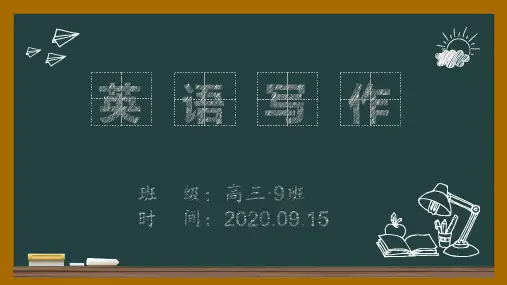
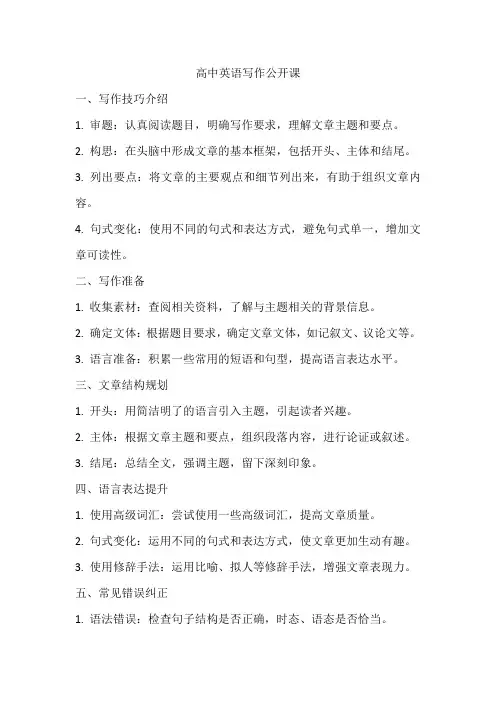
高中英语写作公开课一、写作技巧介绍1. 审题:认真阅读题目,明确写作要求,理解文章主题和要点。
2. 构思:在头脑中形成文章的基本框架,包括开头、主体和结尾。
3. 列出要点:将文章的主要观点和细节列出来,有助于组织文章内容。
4. 句式变化:使用不同的句式和表达方式,避免句式单一,增加文章可读性。
二、写作准备1. 收集素材:查阅相关资料,了解与主题相关的背景信息。
2. 确定文体:根据题目要求,确定文章文体,如记叙文、议论文等。
3. 语言准备:积累一些常用的短语和句型,提高语言表达水平。
三、文章结构规划1. 开头:用简洁明了的语言引入主题,引起读者兴趣。
2. 主体:根据文章主题和要点,组织段落内容,进行论证或叙述。
3. 结尾:总结全文,强调主题,留下深刻印象。
四、语言表达提升1. 使用高级词汇:尝试使用一些高级词汇,提高文章质量。
2. 句式变化:运用不同的句式和表达方式,使文章更加生动有趣。
3. 使用修辞手法:运用比喻、拟人等修辞手法,增强文章表现力。
五、常见错误纠正1. 语法错误:检查句子结构是否正确,时态、语态是否恰当。
2. 拼写错误:认真检查单词拼写,避免出现拼写错误。
3. 逻辑错误:检查段落之间的逻辑关系是否合理,内容是否连贯。
六、实例分析与点评1. 选择一篇典型范文进行讲解,分析其优点和不足。
2. 对学生作品进行点评,指出其存在的问题和改进方向。
3. 鼓励学生互相学习,取长补短。
七、学生实践与互评1. 学生分组进行写作实践,限时完成一篇短文。
2. 学生之间互相点评作品,提出改进意见和建议。
3. 教师对点评情况进行总结和反馈,帮助学生进一步提高写作水平。
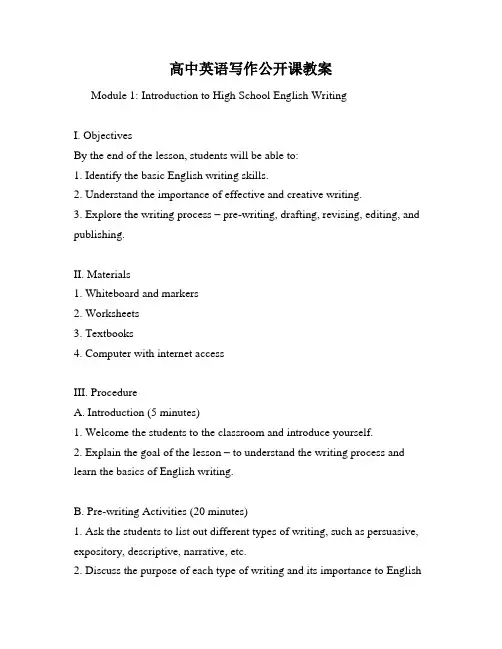
高中英语写作公开课教案Module 1: Introduction to High School English WritingI. ObjectivesBy the end of the lesson, students will be able to:1. Identify the basic English writing skills.2. Understand the importance of effective and creative writing.3. Explore the writing process – pre-writing, drafting, revising, editing, and publishing.II. Materials1. Whiteboard and markers2. Worksheets3. Textbooks4. Computer with internet accessIII. ProcedureA. Introduction (5 minutes)1. Welcome the students to the classroom and introduce yourself.2. Explain the goal of the lesson – to understand the writing process and learn the basics of English writing.B. Pre-writing Activities (20 minutes)1. Ask the students to list out different types of writing, such as persuasive, expository, descriptive, narrative, etc.2. Discuss the purpose of each type of writing and its importance to Englishwriting.3. Introduce the writing process steps – pre-writing, drafting, revising, editing and publishing.4. Divide the students into groups and give each group a sample essay to analyze.5. Ask the students to discuss the essay and identify the writing techniques used.C. Drafting (20 minutes)1. Ask the students to brainstorm ideas on a topic of their choice.2. Give the students guidance on how to formulate an outline based on their ideas.3. Direct the students to create a framework for their essay using their outline.D. Revising (20 minutes)1. Ask the students to share their drafts with the class for peer review.2. Direct the students to look for grammar and spelling errors, sentence structure, and ideas.3. Ask the students to suggest changes and improvements based on feedback from peers and the teacher.E. Editing (15 minutes)1. Provide the students with worksheets that contain tips on how to edit their essays.2. Ask the students to use the worksheets to edit their drafts.F. Publishing (10 minutes)1. Ask the students to share their essays with the class.2. Ask the students to provide feedback to their peers on the essays.3. Instruct the students to finalize their essays by making any necessary changes.G. Conclusion (5 minutes)1. Thank the students for their participation.2. Summarize the key points discussed in the lesson.3. Assign homework (if applicable).IV. AssessmentThe students will be assessed based on their participation in class activities and their ability to apply the writing process steps to their own essays.。
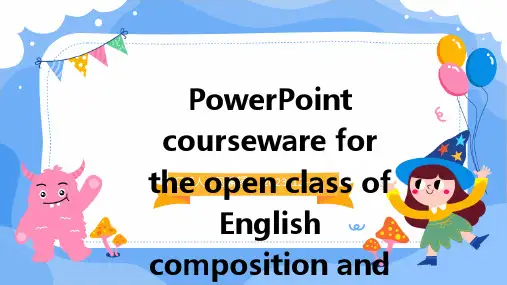
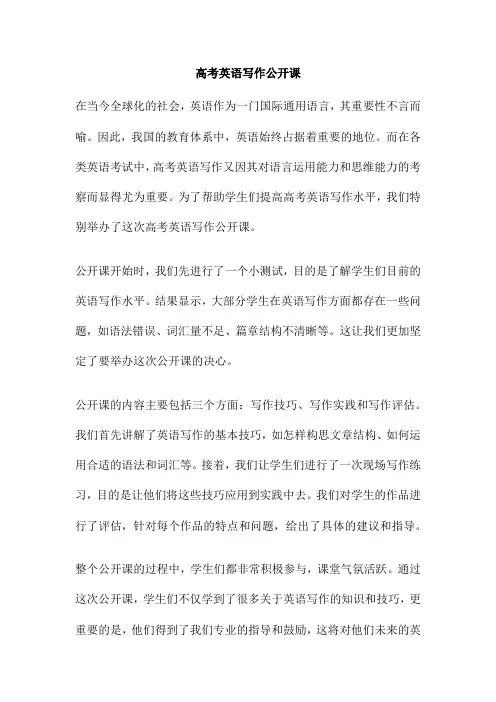
高考英语写作公开课在当今全球化的社会,英语作为一门国际通用语言,其重要性不言而喻。
因此,我国的教育体系中,英语始终占据着重要的地位。
而在各类英语考试中,高考英语写作又因其对语言运用能力和思维能力的考察而显得尤为重要。
为了帮助学生们提高高考英语写作水平,我们特别举办了这次高考英语写作公开课。
公开课开始时,我们先进行了一个小测试,目的是了解学生们目前的英语写作水平。
结果显示,大部分学生在英语写作方面都存在一些问题,如语法错误、词汇量不足、篇章结构不清晰等。
这让我们更加坚定了要举办这次公开课的决心。
公开课的内容主要包括三个方面:写作技巧、写作实践和写作评估。
我们首先讲解了英语写作的基本技巧,如怎样构思文章结构、如何运用合适的语法和词汇等。
接着,我们让学生们进行了一次现场写作练习,目的是让他们将这些技巧应用到实践中去。
我们对学生的作品进行了评估,针对每个作品的特点和问题,给出了具体的建议和指导。
整个公开课的过程中,学生们都非常积极参与,课堂气氛活跃。
通过这次公开课,学生们不仅学到了很多关于英语写作的知识和技巧,更重要的是,他们得到了我们专业的指导和鼓励,这将对他们未来的英语学习产生深远的影响。
这次高考英语写作公开课是一次非常成功的活动。
通过我们的努力,希望能帮助更多的学生们提高他们的英语写作水平,为他们的未来铺平道路。
高考英语概要写作公开课一、课程背景高考英语概要写作是考查学生英语综合运用能力的重要题型。
然而,许多学生在面对概要写作时,常常感到无从下手,得分率不高。
为了帮助学生提高概要写作水平,我们特别开设了这节公开课,为学生提供指导和帮助。
二、课程目标本节课旨在帮助学生:1、了解概要写作的基本概念和要求;2、学习如何快速阅读原文并抓住要点;3、掌握概括和表达的技巧;4、提高英语阅读和写作的综合能力。
三、课程内容1、概要写作的基本概念和要求本部分将介绍概要写作的定义、目的和要求,帮助学生了解概要写作的特点和注意事项。

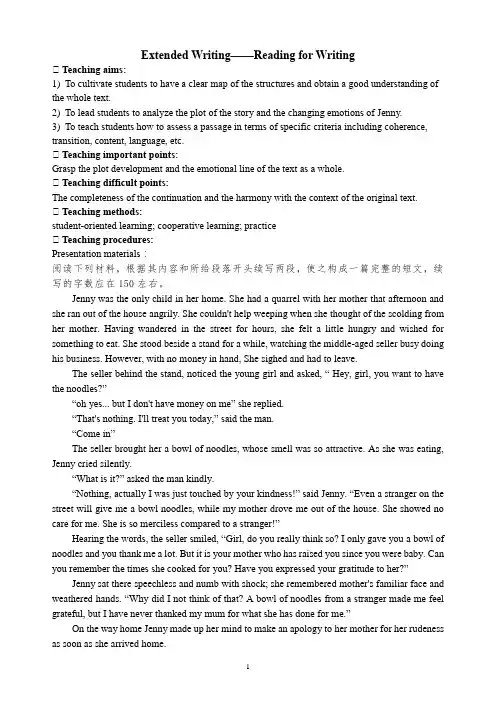
Extended Writing——Reading for WritingⅠ Teaching aims:1)To cultivate students to have a clear map of the structures and obtain a good understanding of the whole text.2)To lead students to analyze the plot of the story and the changing emotions of Jenny.3)To teach students how to assess a passage in terms of specific criteria including coherence, transition, content, language, etc.Ⅰ Teaching important points:Grasp the plot development and the emotional line of the text as a whole.Ⅰ Teaching difficult points:The completeness of the continuation and the harmony with the context of the original text.Ⅰ Teaching methods:student-oriented learning; cooperative learning; practiceⅠ Teaching procedures:Presentation materials:阅读下列材料,根据其内容和所给段落开头续写两段,使之构成一篇完整的短文,续写的字数应在150左右。
Jenny was the only child in her home. She had a quarrel with her mother that afternoon and she ran out of the house angrily. She couldn't help weeping when she thought of the scolding from her mother. Having wandered in the street for hours, she felt a little hungry and wished for something to eat. She stood beside a stand for a while, watching the middle-aged seller busy doing his business. However, with no money in hand, She sighed and had to leave.The seller behind the stand, noticed the young girl and asked, “ Hey, girl, you want to have the noodles?”“oh yes... but I don't have money on me” she replied.“That's nothing. I'll treat you today,” said the man.“Come in”The seller brought her a bowl of noodles, whose smell was so attractive. As she was eating, Jenny cried silently.“What is it?” asked the man kindly.“Nothing, actually I was just touched by your kindness!” said Jenny. “Ev en a stranger on the street will give me a bowl noodles, while my mother drove me out of the house. She showed no care for me. She is so merciless compared to a stranger!”Hearing the words, the seller smiled, “Girl, do you really think so? I only gave you a bowl of noodles and you thank me a lot. But it is your mother who has raised you since you were baby. Can you remember the times she cooked for you? Have you expressed your gratitude to her?”Jenny sat there speechless and numb with shock; she remembered mother's familiar face and weathered hands. “Why did I not think of that? A bowl of noodles from a stranger made me feel grateful, but I have never thanked my mum for what she has done for me.”On the way home Jenny made up her mind to make an apology to her mother for her rudeness as soon as she arrived home.Paragraph 1 Nearing the doorway, Jenny took a deep breath. ________________________ ____________________________________________________________________________ ____________________________________________________________________________ ____________________________________________________________________________ ____________________________________________________________________________ ____________________________________________________________________________ ____________________________________________________________________________ ____________________________________________________________________________ Paragraph 2 A gentle touch on her hair called her mind back. _______________________ ____________________________________________________________________________ ____________________________________________________________________________ ____________________________________________________________________________ ____________________________________________________________________________ ____________________________________________________________________________ ____________________________________________________________________________ ____________________________________________________________________________Step 1 Warming-up: (5mins)1)Ask the students two questions:Did you ever have a quarrel with your parent?Do you know how to fix a broken relationship after a quarrel?2)Then ask the students to watch a video telling mother love.Step 2 While reading (15mins)1)Ask the students to find the six elements in the story.2)Ask the students to read the text again and draw a plot line and anemotional line.3)After drawing the plot line and emotional line, get the students to think:What questions will come into your mind seeing the given sentences?4)Ask the students to draw a mind map to make predictions about what to write in Para1. andPara 2. by using some adjectives and phrasal verbs (动词短语).Step 3 Presentation (20mins)Ask the students to show their writings in front of the whole class.Step4 Summary Summarize the steps to continue a story.Step5 Assignment Complete your writing according to the Assessment Criteria for Writing, and then share your writing with your classmates.。

高中英语写作课程教案3篇高中英语写作课程教案篇1教学目标1. 语言知识目标:1) 能掌握以下单词: newspaper, use, soup, wash, movie, just能掌握以下句型:① —What are you doing? —I'm watching TV.② —What's he doing? —He's using the computer.③ —What are they doing? —They're listening to a CD.④—This is Jenny. —It's Laura here.2) 能掌握语法:现在进行时态的用法。
3) 能运用所学的知识,描述人们正在干的事情。
教学重难点1. 教学重点:1) 词汇、词组搭配和现在进行时的用法。
能用现在进行时的各种形式进行准确的描述和表达正在发生的动作。
2) 能掌握现在进行时态及一些表示具体动作的词组搭配,如: doing homework, using the computer, watching TV, eating dinner… 等2. 教学难点:现在进行时中现在分词的结构及读音,能在交际中准确地运用现在进行时来描述或表达正在进行的动作。
教学工具多媒体教学过程Ⅰ. Warming-up and Lead in1. Greet the Ss and check the homework.2. Watch a video program.Ⅱ. Presentation1. Show some pictures on the big screen. Present the new words and expressions.2. Ss watch and learn the new words and expressions.3. Give Ss some time and try to remember the new words and expressions.4. (Show some pictures on the screen and ask some students to perform the actions.)e.g. T: What are you doing?S: I am doing homework. (Help him/her to answer)T: What is he /she doing?Ss: He /she is doing homework.Teach: watching TV, cleaning, reading a book, eating dinner, talking on the phone...as the same way.5. Work on 1a. Ss read the activities and look at the pictures. Then match the activities with pictures.6. Check the answers with the Ss.Ⅲ. Game (guess)1. T: Now let's play a game. What's she/he doing? You must watch the big screen carefully.(Show some pictures on the big screen quickly) Let Ss guess what's he/she is doing?2. Ss watch and guess the actions.3. Ask and answer about the pictures.—What's he/she doing?—He's/She's …Ⅳ. Listening1. T: What are Jenny, John, Dave and Mary doing? Now let’s listen to the tape, find out the rig ht activities from 1a.2. Play the recording for the Ss twice.3. Ss listen to the recording and write the numbers from 1a.Ⅴ. Pair work1. Ask the Ss to read the conversations in 1c with a partner. Then look at the pictures in 1a. And conversations about other person in the picture.2. Ss make conversations by themselves and practice the conversations.Ⅵ. Listening1. Work on 2a;T: Jack and Steve are talking on the phone. What are they doing now? Listen to the conversations and match the answers with the questions.(Play the recording for the first time, students only listen carefully. Then, listen to the recording again, and match the answers with the questions. )Check the answers.2. Work on 2b.Let Ss read the conversation in 2b first. Then play the recording for the Ss twice.The first time Ss only listen and write down the words in the blanks. Then play the recording again for the Ss to check the answers. (If necessary, press the Pause button to help.)Ⅶ. Pair work1. Now, role-play the conversation with your partners.2. Let some pairs to act out the conversation in front of the class.Ⅷ. Role-play1. Ask Ss to read the conversation in 2d and answerthe questions below.① Are Jenny and L aura talking on the phone?(Yes, they are.)② What's Laura doing now?(She's washing her clothes.)③ What's Jenny doing?(She's watching TV.)④ When do they meet at Jenny's home?(At half past six.)2. Ss read the conversation and answer the questions above.3. Check the answers with the Ss.4. Let Ss work in pairs and role-play the conversation.Homework:1. Review the words and expressions in this period.2. Understand the knowledge about the present progressive tense.3. Make five sentences on what are you doing now.高中英语写作课程教案篇2教学内容:This lesson is about Module 7 Unit 1 “This dog can help him.” of New Standard English, Book 9. This lesson is for the students of Grade Five.教学目标:1、Knowledge aims:a. To enable students to master and use these new words : blind , special.b. To enable students to master the usage of “can” .c. To enable students to use the target sentences correctly : This dog can help him . Can Fifi help the blind people ? No , he can’t . He only wants to play .2、Ability aims:a. Talking about abilities with “can” , “can’t ” and know the objective case.b. To improve students’ language ability.3、Emotion aims:a. To encourage students to cooperate with the others , help each other and learn from each other.b. To educate students to protect animals and help disabled people .教学重点:To master and use the new words , sentence pattern and the usage of “can”。
高三作文公开课教案英文回答:As a high school senior, I have had the opportunity to attend various open classes to improve my writing skills.In this prompt, I will share with you my teaching plan fora high school senior composition class.Title: Exploring Different Writing Styles and Techniques.Objective: To enhance students' writing skills by introducing them to different writing styles and techniques.Introduction:Start the class by asking students about their favorite type of writing and why they enjoy it.Share my own experience of discovering differentwriting styles and how it has helped me become a better writer.Body:1. Introduction to Different Writing Styles:Discuss various writing styles such as descriptive, narrative, persuasive, and expository writing.Explain the characteristics and purpose of each style.Provide examples of well-known authors who excel in each style.2. Analyzing Writing Techniques:Introduce students to different writing techniques such as similes, metaphors, personification, and alliteration.Explain how these techniques can enhance the overall quality of their writing.Share examples of famous literary works thateffectively use these techniques.3. Interactive Writing Activities:Divide students into small groups and assign each group a specific writing style.Ask them to write a short piece using the assignedstyle and incorporate at least one writing technique.Encourage students to share their work with the class, allowing for peer feedback and discussion.4. Examining Real-Life Examples:Provide students with real-life examples of different writing styles and techniques, such as newspaper articles, speeches, and online blogs.Discuss the effectiveness of these examples and howthey engage the reader.Conclusion:Recap the main points discussed in the class.Encourage students to continue exploring different writing styles and techniques on their own.Share some resources, such as books and websites, where students can find more information and inspiration.中文回答:高三作文公开课教案。
英语写作公开课教案高中英语写作公开课教案(高中)Introduction:In this English writing lesson plan, we will focus on developing writing skills for high school students. The lesson aims to enhance students' ability to write coherent and well-organized compositions in English. The teaching plan will cover various writing techniques and strategies to improve both the quality and fluency of English writing.Lesson Objectives:1. To introduce the importance and purpose of English writing skills.2. To teach students the process of generating ideas and organizing them effectively.3. To explore different writing techniques suitable for various writing tasks.4. To provide practice opportunities for students to apply the learned skills.5. To encourage critical thinking and creativity in writing.Lesson Procedures:1. Warm-up Activity (10 minutes)- Engage students in a brainstorming activity related to their personal experiences with writing in English.- Discuss the challenges they face and their goals for improving their writing skills.2. Lesson Introduction (5 minutes)- Explain the significance of English writing skills in various academic and real-life contexts.- Emphasize the importance of clear communication and coherent expression in English writing.3. Writing Process Overview (15 minutes)- Explain the step-by-step process of writing: brainstorming, outlining, drafting, revising, and editing.- Provide examples and explanations for each step.- Discuss the importance of pre-writing activities, such as free writing and mind mapping, to generate ideas.4. Writing Techniques (20 minutes)- Introduce different writing techniques: descriptive writing, persuasive writing, narrative writing, and expository writing.- Discuss the purposes and characteristics of each technique.- Provide examples and practice exercises for each technique.5. Organization and Structure (15 minutes)- Teach students how to structure an essay with an introduction, body paragraphs, and a conclusion.- Explain the importance of coherent paragraphs and transitional phrases for smooth flow and comprehension.- Provide examples and guide students through the process of organizing ideas logically.6. Grammar and Vocabulary Tips (10 minutes)- Highlight common grammar and vocabulary mistakes in English writing.- Provide tips on how to improve grammar usage and expand vocabulary effectively.- Offer supplementary resources, such as grammar checkers and vocabulary-building websites.7. Peer Review and Feedback (15 minutes)- Divide students into pairs or small groups.- Instruct them to exchange their written compositions and provide constructive feedback.- Guide students in giving feedback on content, organization, and language usage.8. Independent Writing Practice (20 minutes)- Assign a writing prompt or topic for students to independently write a composition within the given time frame.- Encourage creativity and critical thinking in their compositions.- Allow students to refer to their notes and resources as needed.9. Conclusion and Discussion (10 minutes)- Summarize the key points covered in the lesson.- Facilitate a class discussion on the challenges and improvements observed during the practice session.- Encourage students to set personal goals for continuous improvement in their writing skills.Conclusion:This English writing lesson plan for high school students provides a comprehensive guide to develop students' writing skills in different genres and styles. By focusing on the writing process, organization, grammar, and vocabulary, students will enhance their ability to express themselves coherently and effectively in written English. With regular practice and feedback, students can become confident and proficient writers.。